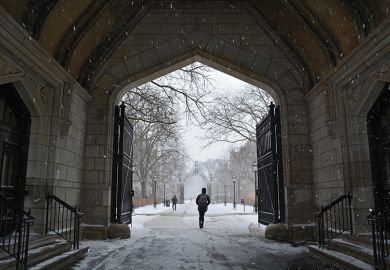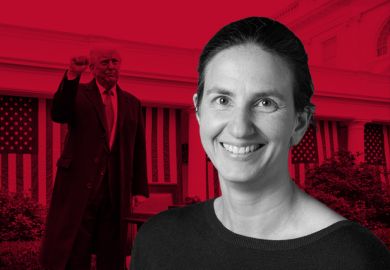Julio Frenk, president of the University of Miami, has a unique perspective on the impact of the election of Donald Trump on US higher education. Not only does he lead a campus located in one of the US’ most diverse cities, he comes from Mexico and served for six years as health minister of the country that is now the target of much of the White House’s anti-immigration ire.
It is little surprise, then, that Professor Frenk is concerned about the coarsening of public debate. And, he told Times Higher Education, the language and attitudes exhibited by Mr Trump are part of a global phenomenon needing to be addressed on university campuses.
“A lot of people have been left behind in the process of globalisation,” he said. “In country after country, we’re seeing people with populist discourse – whether on the left or on the right – being elected, with some common threads that are antithetical to some fundamental values of universities.”
At Miami, Professor Frenk’s priority has been to encourage the airing of political differences in a respectful manner. Part of the response – much of it at the urging of student groups – has been the adoption of new policies encouraging free speech on campus and deterring tactics aimed at shutting out controversial speakers.
The university also has expanded an existing course on public debate to better reflect that outlook, and has initiated a course aimed at promoting intercultural dialogue.
These moves, Professor Frenk said, are part of a wider review designed to ensure that Miami meets its existing commitment to a “T-shaped” curriculum, meaning expertise in a particular field combined with an ability to collaborate beyond that field.
That recommitment to collaborative skills is challenging both students and academics, said Professor Frenk, who took charge of the 17,000-student private institution in 2015.
Many students, at least, appear eager to try. “A lot of this is in response to their own demands,” he said.
The process may be tougher with faculty because they are pressed to incorporate collaboration-focused skills into their existing courses. Such change “requires a huge retraining of the teachers”, Professor Frenk said.
“Faculty development is, I think, the biggest challenge because we were all socialised into a system of teaching,” he said.
This is not the only major shift in teaching that faces academics in Miami and elsewhere, said Professor Frenk, who spent nearly seven years as dean of Harvard University’s T. H. Chan School of Public Health. Advances in technology are increasingly presenting colleges with opportunities for incorporating sophisticated simulators – such as those long used by prospective airline pilots before they try flying actual jets – and other teaching tools using artificial intelligence, into their classrooms.
Early examples at Miami include a simulator-driven hospital environment in the nursing school. “This is not sitting down and memorising stuff,” Professor Frenk said. “This is experiential learning, and the role of the teacher is hugely different.”
Through the various social, economic and demographic upheavals buffeting higher education, the University of Miami is doing well, said Professor Frenk, with applications growing 12 per cent a year for the past two years, at a time when other institutions faced contractions.
“We have not seen the decline of international applications that other schools” have experienced, he said. “But, again, we’ve been very deliberate about sending a welcoming message to international students.”
POSTSCRIPT:
Print headline: Demolishing campus walls
Register to continue
Why register?
- Registration is free and only takes a moment
- Once registered, you can read 3 articles a month
- Sign up for our newsletter
Subscribe
Or subscribe for unlimited access to:
- Unlimited access to news, views, insights & reviews
- Digital editions
- Digital access to THE’s university and college rankings analysis
Already registered or a current subscriber?








